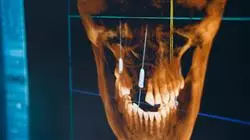University certificate
The world's largest artificial intelligence faculty”
Introduction to the Program
You will delve into 3D Printing applied to the dental field, through a convenient and flexible 100% online format. Bet on TECH!”

In the field of dentistry, specialists rely on machine learning to enrich the clinical experience of patients. However, healthcare professionals face multiple ethical challenges in their practice. One example of this is transparency in obtaining informed consent.
Faced with this, physicians need tools that enable them to understand and address the challenges, promoting responsible practices. In this way, clinicians will avoid situations that lead to reputational damage, suspensions of their medical licenses or legal action for medical malpractice.
To provide experts with a thorough understanding of the impact of Artificial Intelligence, TECH has implemented a Postgraduate diploma that will delve into the ethical conditions in the use of dental data. Under the guidance of a well-versed teaching team, the syllabus will analyze the legal regulations governing Intelligent Automation to ensure lawful practices.
The syllabus will also delve into the social impact of Artificial Intelligence in dental care, based on concepts such as sustainability and equity. The program will also provide graduates with formulas oriented to risk prediction during surgical procedures.
Moreover, the teaching materials will encourage students to develop innovative procedures to improve their medical care through robotics, virtual consultations and automation of administrative tasks.
The program is based on the revolutionary Relearningmethodology, a learning system pioneered by TECH, which consists of reiterating key aspects so that they linger in the mind. In this way, training can be planned individually, since there are no preset schedules or evaluation chronograms. In addition, the Virtual Campus will be available 24 hours a day and will allow users to download the materials and consult them whenever they wish.
Do you want to offer virtual consultations to your most vulnerable patients? Specialize in Teleodontology thanks to this innovative program"
This Postgraduate diploma in Application of Analytical Techniques and Artificial Intelligence in Dentistry contains the most complete and up-to-date program on the market. Its most notable features are:
- The development of case studies presented by experts in Application of Analytical Techniques and Artificial Intelligence in Dentistry
- The graphic, schematic, and practical contents with which they are created, provide scientific and practical information on the disciplines that are essential for professional practice
- Practical exercises where self-assessment can be used to improve learning
- Its special emphasis on innovative methodologies
- Theoretical lessons, questions to the expert, debate forums on controversial topics, and individual reflection assignments
- Content that is accessible from any fixed or portable device with an Internet connection
You will address the main ethical challenges in the use of Artificial Intelligence, so that your procedures stand out for their empathy and human quality"
The program’s teaching staff includes professionals from the field who contribute their work experience to this educational program, as well as renowned specialists from leading societies and prestigious universities.
The multimedia content, developed with the latest educational technology, will provide the professional with situated and contextual learning, i.e., a simulated environment that will provide immersive education programmed to learn in real situations.
This program is designed around Problem-Based Learning, whereby the professional must try to solve the different professional practice situations that arise during the academic year For this purpose, the students will be assisted by an innovative interactive video system created by renowned and experienced experts.
You will drive the most effective strategies to preserve the safety and maintenance of dental equipment"

The Relearning system will lead you to advance in a much more agile way in the Application of Analytical Techniques and Artificial Intelligence in Dentistry"
Why study at TECH?
TECH is the world’s largest online university. With an impressive catalog of more than 14,000 university programs available in 11 languages, it is positioned as a leader in employability, with a 99% job placement rate. In addition, it relies on an enormous faculty of more than 6,000 professors of the highest international renown.

Study at the world's largest online university and guarantee your professional success. The future starts at TECH”
The world’s best online university according to FORBES
The prestigious Forbes magazine, specialized in business and finance, has highlighted TECH as “the world's best online university” This is what they have recently stated in an article in their digital edition in which they echo the success story of this institution, “thanks to the academic offer it provides, the selection of its teaching staff, and an innovative learning method aimed at educating the professionals of the future”
A revolutionary study method, a cutting-edge faculty and a practical focus: the key to TECH's success.
The most complete study plans on the university scene
TECH offers the most complete study plans on the university scene, with syllabuses that cover fundamental concepts and, at the same time, the main scientific advances in their specific scientific areas. In addition, these programs are continuously being updated to guarantee students the academic vanguard and the most in-demand professional skills. In this way, the university's qualifications provide its graduates with a significant advantage to propel their careers to success.
TECH offers the most comprehensive and intensive study plans on the current university scene.
A world-class teaching staff
TECH's teaching staff is made up of more than 6,000 professors with the highest international recognition. Professors, researchers and top executives of multinational companies, including Isaiah Covington, performance coach of the Boston Celtics; Magda Romanska, principal investigator at Harvard MetaLAB; Ignacio Wistumba, chairman of the department of translational molecular pathology at MD Anderson Cancer Center; and D.W. Pine, creative director of TIME magazine, among others.
Internationally renowned experts, specialized in different branches of Health, Technology, Communication and Business, form part of the TECH faculty.
A unique learning method
TECH is the first university to use Relearning in all its programs. It is the best online learning methodology, accredited with international teaching quality certifications, provided by prestigious educational agencies. In addition, this disruptive educational model is complemented with the “Case Method”, thereby setting up a unique online teaching strategy. Innovative teaching resources are also implemented, including detailed videos, infographics and interactive summaries.
TECH combines Relearning and the Case Method in all its university programs to guarantee excellent theoretical and practical learning, studying whenever and wherever you want.
The world's largest online university
TECH is the world’s largest online university. We are the largest educational institution, with the best and widest online educational catalog, one hundred percent online and covering the vast majority of areas of knowledge. We offer a large selection of our own degrees and accredited online undergraduate and postgraduate degrees. In total, more than 14,000 university degrees, in eleven different languages, make us the largest educational largest in the world.
TECH has the world's most extensive catalog of academic and official programs, available in more than 11 languages.
Google Premier Partner
The American technology giant has awarded TECH the Google Google Premier Partner badge. This award, which is only available to 3% of the world's companies, highlights the efficient, flexible and tailored experience that this university provides to students. The recognition as a Google Premier Partner not only accredits the maximum rigor, performance and investment in TECH's digital infrastructures, but also places this university as one of the world's leading technology companies.
Google has positioned TECH in the top 3% of the world's most important technology companies by awarding it its Google Premier Partner badge.
The official online university of the NBA
TECH is the official online university of the NBA. Thanks to our agreement with the biggest league in basketball, we offer our students exclusive university programs, as well as a wide variety of educational resources focused on the business of the league and other areas of the sports industry. Each program is made up of a uniquely designed syllabus and features exceptional guest hosts: professionals with a distinguished sports background who will offer their expertise on the most relevant topics.
TECH has been selected by the NBA, the world's top basketball league, as its official online university.
The top-rated university by its students
Students have positioned TECH as the world's top-rated university on the main review websites, with a highest rating of 4.9 out of 5, obtained from more than 1,000 reviews. These results consolidate TECH as the benchmark university institution at an international level, reflecting the excellence and positive impact of its educational model.” reflecting the excellence and positive impact of its educational model.”
TECH is the world’s top-rated university by its students.
Leaders in employability
TECH has managed to become the leading university in employability. 99% of its students obtain jobs in the academic field they have studied, within one year of completing any of the university's programs. A similar number achieve immediate career enhancement. All this thanks to a study methodology that bases its effectiveness on the acquisition of practical skills, which are absolutely necessary for professional development.
99% of TECH graduates find a job within a year of completing their studies.
Postgraduate Diploma in Application of Analytical Techniques and Artificial Intelligence in Dentistry
Welcome to the Postgraduate Diploma in Application of Analytical Techniques and Artificial Intelligence in Dentistry from TECH Global University, an innovative postgraduate program designed to take your dental practice to new heights by leveraging the latest technologies. In an increasingly technology-driven dental world, it is crucial to be at the forefront of analytical techniques and artificial intelligence to provide more accurate and personalized care to your patients. This program will not only give you a thorough understanding of these technologies, but will also empower you to apply them effectively in your daily practice. TECH's online classes offer the flexibility you need to advance your education without sacrificing your daily schedule. By enrolling in the Postgraduate Diploma, you will embark on an educational journey that will immerse you in the world of advanced analytical techniques and artificial intelligence applied specifically to the field of dentistry.
Discover the world of Artifical Intelligence in dentistry
This postgraduate program will provide you with the skills necessary to use advanced analytical tools in dental diagnosis, personalized treatment planning and efficient clinical information management. You will learn how to integrate artificial intelligence to obtain deeper insights and improve decision making at every stage of dental treatment. At TECH Global University, we are proud to offer a program that combines educational excellence with practical, real-world application. Throughout the Postgraduate Diploma, you will participate in hands-on projects that will allow you to directly apply your knowledge, preparing you for the challenges and opportunities of a modern, intelligent dental practice. Get ready to excel in your field by graduating from the Postgraduate Diploma. Join us and discover how the combination of analytics technology and artificial intelligence can transform your dental practice and elevate the quality of care you provide to your patients.







